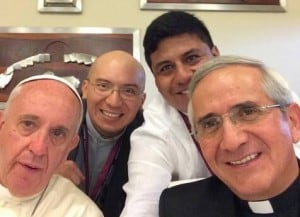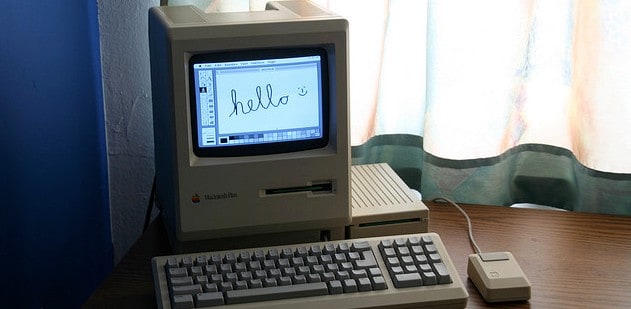I think the soundtrack of hell must be the sound of a dial-up modem on repeat.1
I realize, however, that while many of us can call to mind that cringeworthy sound immediately, it has become so dated that others may not have ever heard it.
It’s sort of like the mimeograph. I have heard stories about the scent it gave off or the way it turned your fingers purple. I’ve never actually seen one. Others might ask, “Mimea-what?”
These things did their jobs well enough — or so we thought at the time. But technologies develop, and what had seemed adequate soon seems outdated or even comically quaint.
I try to repress my smile when people of another generation ask us how often we come out with a new issue of The Jesuit Post. “Well, we’re a website, so… always?” At the same time, our website is finally catching up with technology by introducing a mobile-friendly redesign. Until last week, one still had to manually zoom in when reading TJP on mobile — something we will likely be laughing about in the not-so-distant future.
We hope you love the new look of TJP — and hope you have patience as we continue to work out the kinks in the coming weeks.
While we have a new design, we’ll still be delivering the quality content we’re known for, touching the sacred and the secular, the old and the new. That’s just what you’ll find in the latest month on TJP.
A widely-read New Yorker article, Ten Days in June, pithily captured the enormity of one significant event after another in a short period of time last month, from landmark Supreme Court decisions to tragedy in Charleston and our President’s graceful response. For Catholics, we also received a new encyclical.
In addition to a summary of Laudato Si we published the day the encyclical was released, Ken Homan wrote about some of the subtleties of the document, including the fact that this encyclical was both something new but also very much in line with the Church’s social teaching. He writes:
The Church’s social teaching is vast and has frequently touched on the environment… Many people overlooked or deemphasized those environmental admonitions in past encyclicals. Francis’ is saying: “Oh no you don’t!” He makes it abundantly clear that Catholic social teaching necessarily includes ecological care and love of the poor.
In Political Climate Change, Danny Gustafson makes a similar point. He describes the new-but-not-really-newness of Pope Francis:
Francis isn’t the first or only Catholic leader who doesn’t always fit neatly into one political category. As a couple of examples, check out comments by John Paul II on labor unions or Benedict XVI on environmental protection. Both are commonly viewed as conservatives, but that label, like most labels, doesn’t hold true across the board.
Sadly, however, on the very same morning we woke up to read the encyclical — or at least summaries of it if we didn’t have the time to get through the nearly 200 pages — we also heard about the tragedy in Charleston. Jason Welle powerfully connected the two:
Another tragedy of gun violence. Another racist incident against Black Americans. In the last year we have witnessed the rupture of social bonds too many times. Against Pope Francis’s call to recover our bonds of mutual care, Black lives cry out to be protected from exclusion and recognized as possessing the dignity given by God.
Moreover, it wasn’t just Charleston. In a disturbing trend that has led many to question whether much has changed in the last five decades, we heard about a number of black churches being burned to the ground. In Black Churches Matter, Brendan Busse responded:
If we are silent in the face of the terrorism that burns black churches to the ground then we dare not speak of our own persecution if and when it comes. For if we do not participate in the suffering of crucifixion we have no share in the redemption of resurrection. If we fail to proclaim that black lives matter (and fail to live as if it were so) then neither will our own.
Of course, this mix of old and new doesn’t just apply to the events of the world around us but also to our own lives, including our lives of prayer. In an honest reflection in which he describes some of his struggles in prayer — and are there many things more constant across generations than struggles in prayer? — Damian Torres-Botello describes an interesting mix of new and old:

From Jesuitas Ecuador
I’m clumsy when I pray, not very focused, often distracted. I try to concentrate. I even have strategies to keep me on task. I maintain a gratitude journal, I carry a little notebook and I have an an app to help me remember what to pray for, I review my day before I go to bed, I pray the rosary, and I discovered Pope Francis’ Five Finger Prayer.
The Pope himself recently mentioned that he feels like a “great-grandfather” when someone wants to take a selfie with him, though the Pope doesn’t condemn the selfie. He joins in. He recognizes that much of our communication today happens with a smartphone.
He might feel like a great-grandfather, but the Pope gets it. With our mobile-friendly redesign, we are trying to catch up.
– // –
Cover photo by Stefan Schlautmann
- I guess with some wailing and gnashing of teeth as well. ↩


